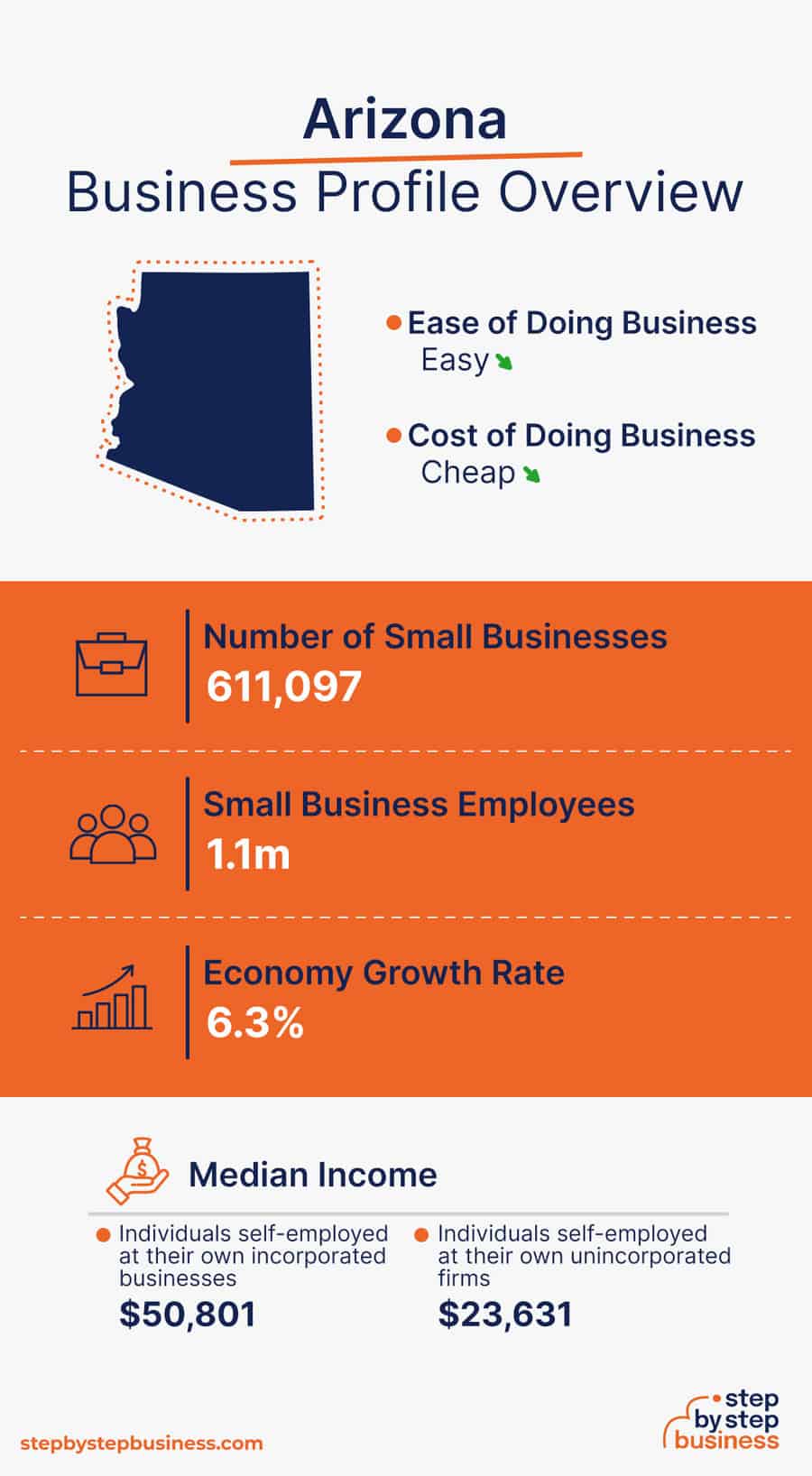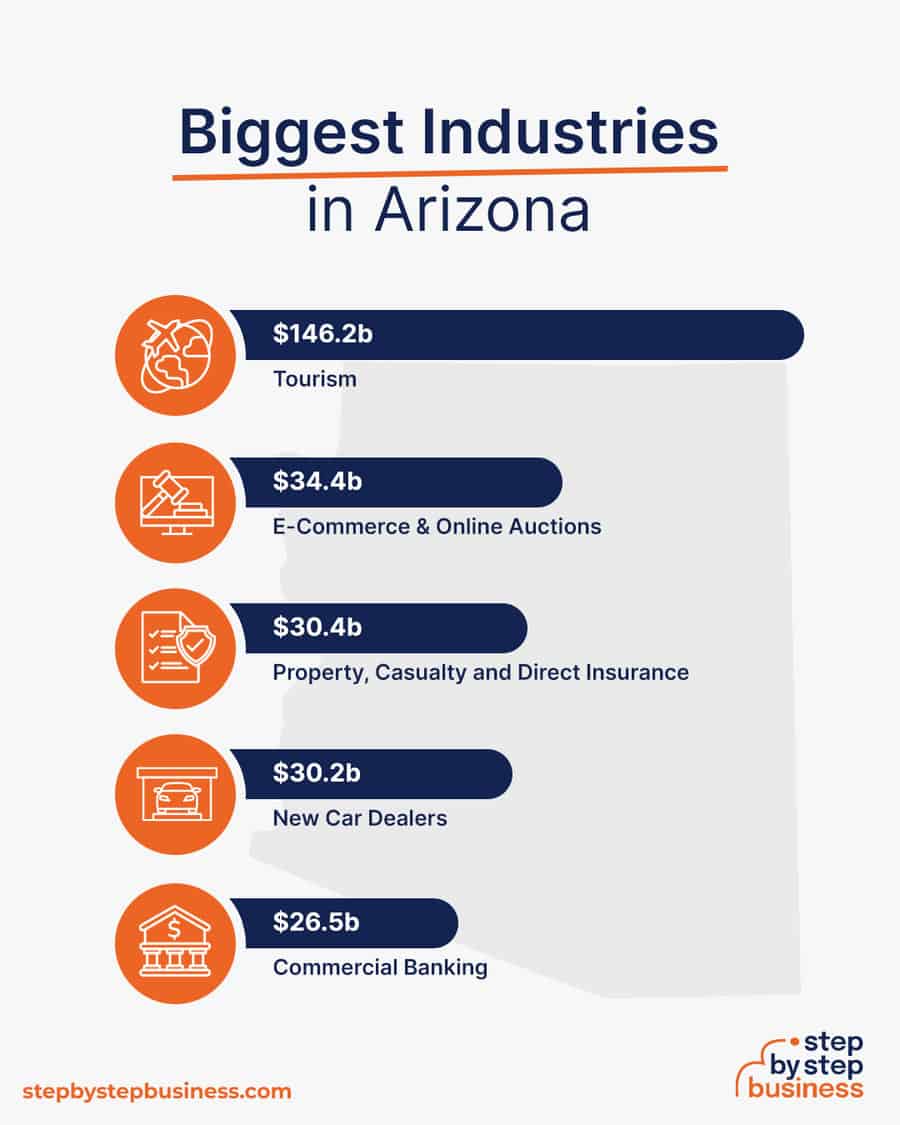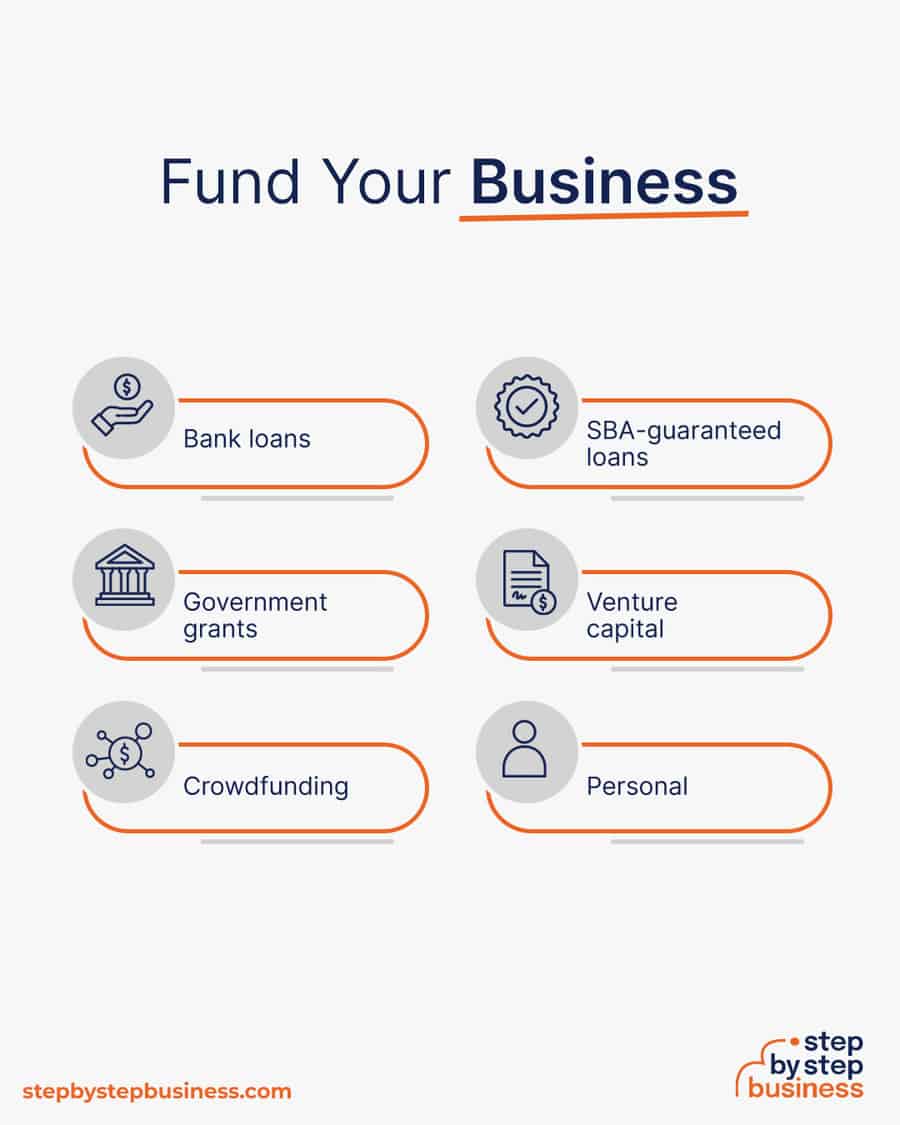
Esther is a business strategist with over 20 years of experience as an entrepreneur, executive, educator, and management advisor.
David has been writing and learning about business, finance and globalization for a quarter-century, starting with a small New York consulting firm in the 1990s.
Published on August 19, 2021

With its warm weather year-round, stunning natural beauty, and bustling arts scene, the Grand Canyon state is a great place to live and do business. That’s why Arizona posted the fifth highest population growth in 2020 as more and more Americans made it their home.((https://www.ibisworld.com/united-states/economic-profiles/arizona/)) What’s more, as the pandemic recedes, Arizona has produced the US’ third best economic recovery in terms of jobs.((https://azgovernor.gov/governor/news/2021/11/arizona-projected-add-more-700000-jobs-2030/))
If you’re thinking of starting your own business there, you’ve come to the right place. This step-by-step guide lays out all you need to know develop and launch a business in Arizona, so you can decide if it’s right for you.


The crucial first question is, what sort of business would you like to run? You may have several ideas in your head, or maybe you haven’t gotten that far. Either way, it’s wise to look closely at the state itself and at your own abilities to best determine which areas might offer the most opportunity.
To develop a business idea, you could:
Once you have a few ideas in mind, do some homework to decide if your ideas are feasible. Here are some things to consider when choosing a business idea:
Once you’ve chosen a business idea, get more specific in your evaluation of the opportunity. Consider the why, what, how, and who.
First, consider the viability of the business idea you have in mind. Here are three questions to consider:
Starting a business will require investment, so you mustn’t just leave the profitability of your idea to assumptions. Make it a point to conduct your own research and ask people you know and trust what they think of your idea.
![]()
Arizona’s economic development website allows visitors to examine business profiles, state demographics, rising industries, and more.
The next thing to do is define your offerings. Ask yourself:
You may consider offering related products or services to increase purchase sizes and boost overall value for customers. This step is going to define how your business will look to customers and why they will buy, so take your time and be sure.
Before determining your price list, get to know your competitors. Visit the shops and websites of companies that offer similar products or services — see what they’re selling and at what prices and use this to inform your decisions.
If you have a direct competitor, it’s a good idea to choose a competitive price point. Run the numbers to find your break-even, then use this Step By Step profit margin calculator to determine your mark-up and final price point.
You’ll also need to consider how to position your product. Are you going to offer a lower-priced alternative, a la Walmart, or are you going to position your business as more high-end, like a Pottery Barn or Restoration Hardware?
Once you’ve locked on a pricing system that works for you, you’ll need to test it to see if this is attractive to your target market.
Knowing your target market is crucial to successful sales and marketing. This is where customer profiling comes in handy. The first thing to do is figure out whether you’re selling to consumers or businesses. If you choose consumers, determine which people are most likely to buy, by looking at:
Knowing your customers will allow you to shape your messaging and know where to place your marketing. For example, based on who your customers are and what they like, are they more likely to be on Facebook or TikTok?
If you are selling to businesses, first determine what kinds of firms will be interested in what you’re offering. Next, figure out the relevant decision-maker within these companies — it may be a VP, IT manager, or head of sales — and adjust your marketing accordingly.
Your business name is your business identity, so choose one that encapsulates your objectives, services, and mission in just a few words. You probably want a name that’s short and easy to remember.
Here are some ideas for brainstorming your business name:
Once you have a shortlist of names, check the Arizona Secretary of State database to see if they’re available to register. The search also includes trademarked names, which helps to ward off any potential problems later. It’s also a good idea to read through the Arizona Trade Name and Trademark handbook, which walks you through the regulations and processes step by step, as well as giving links to the relevant forms to be filled out.
Once you’re sure that the name is all yours and meets the regulations, go ahead and register the name. You don’t have to register a trade name, but it is considered good business practice to do so. In Arizona, trade names must be renewed every five years at a cost of $10.
If you plan to set up a corporation or limited liability partnership, you should also check the name availability with the Arizona Corporation Commission. Go to ecorp.azcc.gov and click File, then Name, then Check Name Availability.
Finally, you might also want to check the availability of related domain using Domain Name Checker tool. Using “.com” or “.org” sharply increases credibility, so it’s best to focus on these.
Drawing up a business plan may seem like a daunting task, but it’s an essential step in creating a successful business. The plan will function as a trail map to guide your startup through the launch process and maintain focus on your key goals. A business plan also enables potential partners and investors to better understand your company and its vision.
If you’ve never created a business plan yourself before, it can be an intimidating task. Consider hiring an experienced business plan writer to create a professional business plan for you.

Choosing your business location is an important decision because it can affect your taxes, legal requirements, and revenue. But you’ve already decided to launch your business in Arizona, so we can check that box.
Businesses come in several varieties, each with its pros and cons. The legal structure you choose for your business shapes your taxes, personal liability, and business registration requirements, so it’s important to choose wisely.
The most popular business entity types are outlined below.
Sole proprietorship is the most simple and straightforward structure, and therefore the most common for small businesses. It is an unincorporated business, with no legal distinction made between the business and the owner. As a sole proprietor, all income goes to you, but you are also liable for any debts, losses, or liabilities incurred by the business.
General partnership is similar to sole proprietorship, but with two or more people forming the company. Again, they keep the pre-tax profits but are jointly liable for any losses or liabilities. In a general partnership, each partner is known as a general partner and has unlimited liability.
This business structure is popular with lawyers, accountants, and architects. It is more formal than a general partnership and allows each partner to limit their liabilities and share management responsibilities according to an agreement between the partners. This can be a good choice when one or more partners want to invest in the business but have little or no management responsibility. Read about the difference between LLC and LLP here.
A full list of all Limited Partnership requirements and forms can be found at this page on the Arizona State Government website.
The next step up is a corporation, in which the company is a separate legal entity from its owners. In this structure, the owners are not personally liable for losses, but take their profits through shareholder dividends.
In Arizona, Corporations and LLCs are filed not with the Secretary of State but with an entirely separate agency called the Arizona Corporation Commission (ACC). In some states, you’re required to register as an “S” corp, “C” corp, or “501c3” corp. However, these are federal tax designations – in Arizona you just form a corporation or a nonprofit corporation.
Once you’re ready, you can submit your formation documentation with the ACC. The fastest, most convenient way is by using their online services at ecorp.azcc.gov.
In Arizona, there is a fee of $60 to register a corporation. The ACC has a full schedule of fees available online.
A limited liability company (LLC) combines characteristics of corporations with those of sole proprietorships. As the name suggests, the owners are not personally responsible for liabilities or debts. As an LLC, you’ll need to choose whether you want to be taxed as an LLC or as an S Corp.
The regulations for LLCs vary from state to state. Although they are more straightforward to set up than a corporation, Articles of Organization must be filed with the state for the LLC to become a legal entity.
In Arizona, you do this via the ACC. Start your registration process here. If approved, you’ll receive a letter with instructions on what to do next. If rejected, your letter will instruct you on how to resubmit the paperwork so that you are successful. Again, the fee is $60.
You will also need to appoint an Arizona statutory agent. Your statutory agent will be responsible for receiving paperwork from the state.
An easy and quick way to form an LLC in Arizona is to use ZenBusiness’s online LLC formation service.
Finally, you may be interested in a nonprofit if your business idea has a social purpose. A non-profit organization is a legal entity organized and operated for a public or social benefit, as opposed to a business formed to generate a profit for its owners.
You will also need to appoint a registered agent, also known as an agent for the service of the process. Your Arizona registered agent will be responsible for receiving all of the official paperwork sent from the state.
Again, in Arizona a non-profit is registered with the ACC, for a fee of $40.

The final step before you’re able to pay taxes is getting an Arizona Employer Identification Number or EIN. You can file for your EIN online or by mail or fax: visit the IRS website to learn more. Keep in mind, if you’ve chosen to be a sole proprietorship you can simply use your social security number as your EIN.
Once you have your EIN, you’ll need to choose your tax year. Financially speaking, your business operations will occur over the period of a calendar year (January–December) or a fiscal year, a 12-month period that can start in any month. This will determine your tax cycle, while your business structure will determine which taxes you’ll pay.
![]()
The IRS website also offers a tax-payers checklist and taxes can be filed online.
It is important to consult an accountant or other professional to help you with your taxes to ensure you are completing them correctly.
In Arizona, business taxes are collected by the Arizona Department of Revenue (ADOR). You must register your business with ADOR before conducting any taxable business activity in Arizona. ADOR publishes a comprehensive guide to paying business taxes in Arizona, available online. It also publishes a fact sheet, walking you through the steps required to register for taxes.
After creating your business plan, you should know how much money you’ll need to launch your business. Securing financing is your next step and there are plenty of ways to raise capital:

You’ll likely need to obtain certain business licenses and permits to comply with Arizona law. If you are selling tangible goods in Arizona, you will need a seller’s permit.
There is no general business license required in Arizona, but some cities require certain businesses to be licenced in order to operate. In Phoenix, for example, auctions, amusement parks and bingo halls require a license, as do venues serving alcohol such as wine festivals or bars. In Flagstaff, a license is required for any permanent business, which means any business operating from a fixed site for 45 days or more within a calendar year. There is a license fee of $8.
There are also a number of tax licenses across the state which you may have to obtain, including the Transaction Privilege Tax License (commonly referred to as a sales tax license), and Withholding Tax Registration, which enables you to withhold employment taxes from your employees wages. Your city, town, or county may also have additional requirements, such as signage and zoning permits. Speak to representatives of your local governments about licensing requirements.
This is not a step to be taken lightly, as failing to comply with legal requirements can result in hefty penalties.
If you feel overwhelmed by this step or don’t know how to begin, it might be a good idea to hire a professional to help you check all the legal boxes.
For peace of mind and to save time, we recommend using MyCorporation’s Business License Compliance Package. They will research the exact forms you need for your business and state, and provide them to you to make sure you’re fully compliant.
More resources:
In order to launch your business, you will need to have somewhere to keep the money you make, and that requires opening a bank account.
Keeping your business finances separate from your personal account makes it easy to file taxes and track your company’s income, so it’s worth doing even if you run your business as a sole proprietorship. Opening a business bank account is quite simple, and similar to opening a personal one. Most major banks offer business account options, just inquire at your preferred bank to learn about rates and features.
Banks vary in terms of offerings, so it’s a good idea to consider your options to choose the best plan that works for you. Once you choose your bank, you’ll need to bring your EIN (or Social Security Number if you decide on a sole proprietorship), articles of incorporation, and any other legal documentation that proves your business is registered.
Business insurance is an area that often gets overlooked yet it can be vital to your success as an entrepreneur. Insurance protects you from unexpected events that can have a devastating impact on your business.
Here are some of the different types of insurance to consider:

As opening day nears, prepare for launch by reviewing and improving some key elements of your business.
New businesses need to have the right tools and industry-specific software in place to help them manage their operations effectively.
One of the most important tools for a new business is an inventory management system, which allows them to track their inventory levels, monitor sales, and reorder products when necessary.
Another essential tool is a customer relationship management (CRM) system, which helps businesses manage their interactions with customers and prospects, and track sales leads.
Other useful software for new businesses might include payroll software, project management tools, and marketing automation software. By investing in the right tools and software, new businesses can streamline their operations, save time and money, and ultimately increase their chances of success.
Website development is crucial because your site is your online presence and needs to convince prospective clients of your expertise and professionalism.
You can create your own website using services like WordPress, Wix, or Squarespace. This route is very affordable, but figuring out how to build a website can be time-consuming. If you lack tech-savvy, you can hire a web designer or developer to create a custom website for your business.
They are unlikely to find your website, however, unless you follow Search Engine Optimization (SEO) practices. These are steps that help pages rank higher in the results of top search engines like Google.
Online marketing is crucial for new businesses as it provides a cost-effective way to reach a wider audience and build brand awareness. With a well-planned online marketing strategy, new businesses can establish their presence, attract potential customers, and compete with established players in their industry.
Here are some powerful digital marketing strategies for small businesses:
Take advantage of your website, social media presence and real-life activities to increase awareness of your offerings and build your brand.
Traditional marketing is any form of marketing that uses offline media to reach an audience. Some options include:
As your business grows, you will likely need workers to fill various roles and positions. But before you begin the hiring process, you should first consider the essential positions for your line of work.
What levels of management and employees will you have? What is your pay scale? Costs are always an issue for a startup, but you need to make sure that you pay enough to hire people with the right skills and experience.
It’s a good idea to create a hiring plan. First, determine which hires you’ll need to launch, then the future hires you’ll need as the business gets going. Be cautious and selective when hiring people for any role. You want to build a great team that will make your business run smoothly and create a great work environment so you’ll retain them for a long time.
![]()
You want to build a great team that will make your business run smoothly, and then create a great work environment so that you’ll retain your team for a long time.
In Arizona you need to report new hires to the state’s New Employee Registry. Find out how to report via Arizona’s New Hire Reporting system.
With everything in place, you’re now ready to throw open the doors on opening day! When you do, you’ll want some customers coming in. Here’s how to find them.
Make sure to highlight the unique selling propositions, or USPs, of your products and services. Customers may already want your offerings, so your job is to convince them to pick you over your competitors.
Here are some good selling points that you can capitalize on:

Make sure that you are selling through the right channels. You know your target customers by now – where and how are they most likely to buy? Do they buy online or in stores?
If you don’t have a store, you can find partner stores where your products can be sold. You can sell both online and directly but focus your efforts on the channel that matches your target market’s buying behavior.
If you’re selling to businesses, your sales channels may be online or they may involve direct sales calls. Again, understand the buying behavior of the decision-maker within the business.
Help clients find you more easily by placing your marketing where they are likely to find it. With the right marketing strategies in place, a business can reach new audiences, build brand awareness, and ultimately grow its customer base and revenue.
Effective marketing can help businesses differentiate themselves from competitors, establish a strong online presence, and engage with customers through various channels such as social media, email marketing, and advertising.
By investing in the right marketing tactics and continually analyzing and optimizing their efforts, businesses can position themselves for long-term growth and success.
You’re now ready to start making a good living in the Grand Canyon state! But you may want to bookmark this page, just in case.
Registering your business as a Corporation or LLC will cost $60 in Arizona. In addition to that, there are the costs of starting any business, which vary enormously depending upon what industry you decide to start your business in. If you’re running a business from home, it could cost as little as a few hundred dollars to get started.
Arizona is also one of the cheapest states to run a business in thanks to lower than average taxes, including property, gas and personal income taxes, all of which helps keeps costs down.
How long does it take to register a business in Arizona?Processing time for online trade name filings takes two to three weeks, while the registration process for an LLC is a little longer. Regular Articles of Organization processing can take up to 30 business days, although for an extra fee the process can be expedited.
Is Arizona good for business?Arizona’s GDP currently stands at $321 billion, and the state’s economy grew by an average 3.3% between 2014 and 2019, ranking it 9 out of the 50 US states in terms of growth.
Employment in the state also grew by 2.7% between 2013 and 2018, ranking it 6 out of the 50 states in terms of employment growth.
These growth trends coupled with below average tax rates serve to make Arizona a great state in which to start a new business.